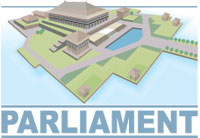Columns
JHU’s bill on long road to law
Amidst moves to amend certain sections of the 13th Amendment to the Constitution, a constituent partner of the ruling United People’s Freedom Alliance (UPFA), presented a Bill to Parliament last Tuesday, to repeal the Amendment in its entirety.
The Bill was presented as a Private Member’s Bill by JHU MP Ven. Aturaliye Ratana Thera and seconded by UNP Puttalam District MP Palitha Range Bandara.

Even though the Bill is now included in the Order Book of Parliament, it will have to remain there for a while, as a long procedure awaits it before it could be taken up for debate.
It will first be referred to the relevant Cabinet Minister for a report to be submitted within six months to Parliament. If no report is forthcoming within six months, the MP who presented the Bill, could seek a date for the Bill to be debated.
There is also provision in the law for the Bill to be challenged before the Supreme Court for its constitutionality, within a week of its presentation. The bad news for a Private Member’s Bill is that, since 1978, despite several Bills of this nature dealing with matters of public interest, including one to abolish the Executive Presidency in 1994, were presented, none have become law.
However, whether the Bill becomes law or not, its introduction, coupled with Government moves to scale down land and police powers given to Provincial Councils (PC), has once again triggered a public debate on how viable the PC system is for the country.
It’s no secret that, when the PC system was introduced to the country, consequent to the 1987 Indo-Lanka Accord, it was strongly resisted by the people. The 13th Amendment to the Constitution was pushed through Parliament, despite a divided opinion from Supreme Court on its constitutionality, a fact mentioned in the JHU Bill.
“The Supreme Court did not approve the provisions of the 13th Amendment Bill as being consistent with the Constitution, as only four of the nine-judge Bench held that the people’s approval at a referendum was not required to enact it, while five judges held that at least one or more of its provisions was in violation of the Constitution, and required the people’s approval at a referendum,” the Bill states.
It also states that the PC system threatens the unitary character of the country. “Sri Lanka is a free, sovereign, independent and unitary State, and it is the duty of the State to safeguard the independence, sovereignty, unity and territorial integrity of Sri Lanka, which the provisions of the 13th Amendment threatens,” it states.
Meanwhile, a buzz was also created in Parliament last Wednesday, when UPFA Colombo District MP Duminda Silva returned to Parliament after an extended period of leave of absence from the House. It’s the first time he attended sittings since being injured in a shooting incident in October 2011, in which, former MP Bharatha Lakshman Premachandra was killed.
MPs are granted three months leave at a time, but a leave motion has to be approved by the House, before the lapse of the time period, to have it extended for further three months. As there is no limitation on how many three-month periods an MP can stay on leave, they enjoy the privilege of continuing to be MPs, despite being unable to carry out their responsibilities of being a Parliamentarian for extended periods of time.
Follow @timesonlinelk
comments powered by Disqus

